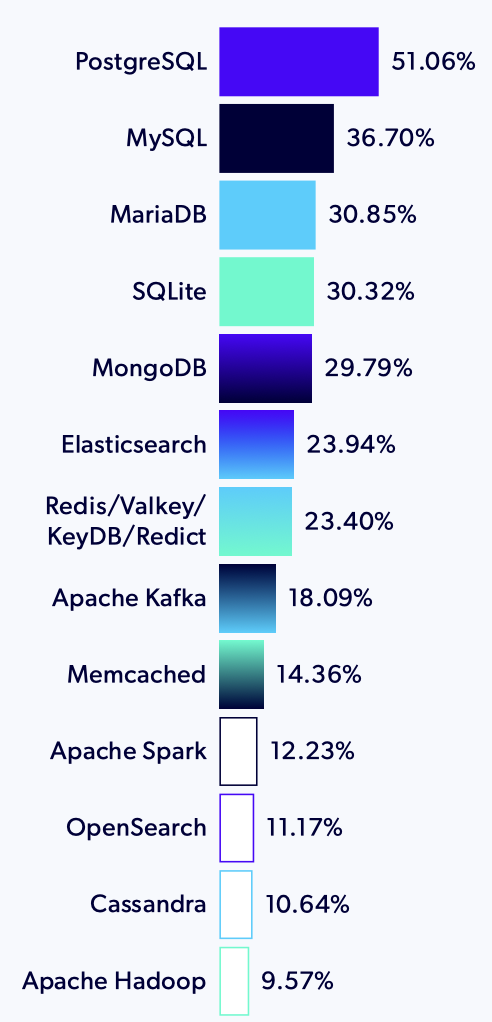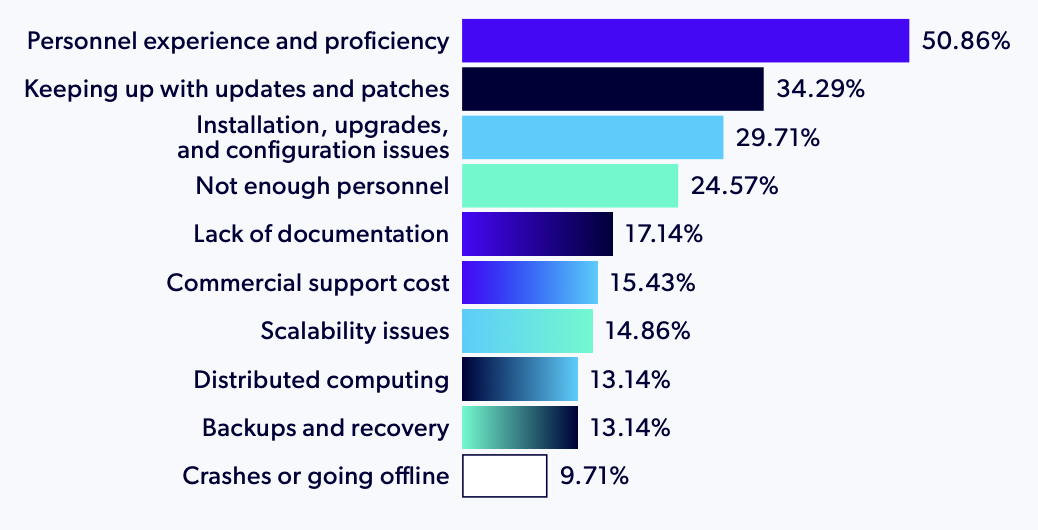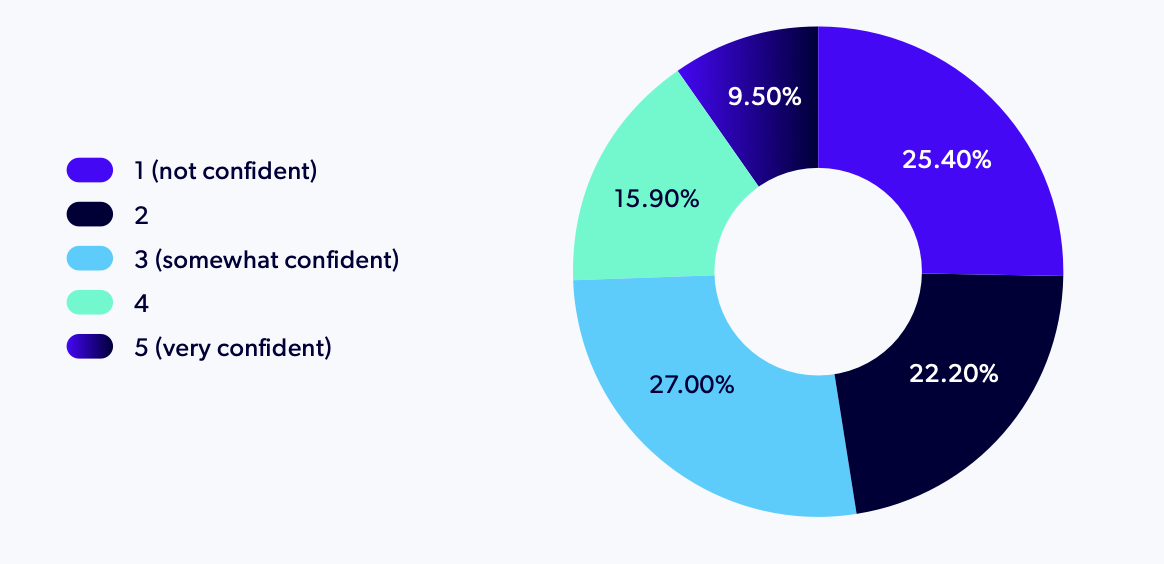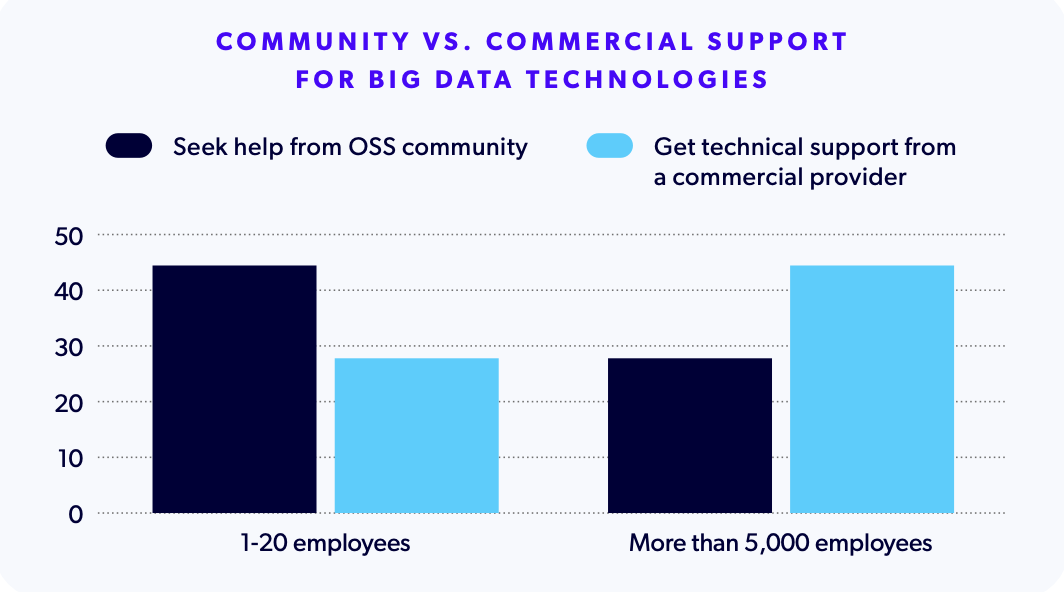Blog
May 16, 2025
The Top Open Source Databases and Big Data Technologies of 2025
Databases,
Hadoop,
Apache Kafka
Databases and data technologies are one of the fastest growing areas in open source. Today’s leading open source data technologies exceed the capabilities of traditional databases, and 90% of organizations rely on multiple technologies to stream data, create analytics, and integrate data from various sources. Given the massive amount of data being created and processed by modern applications, finding the right software for your needs is more important than ever before.
In this blog, we look at the top open source databases and data technologies, as well as challenges unique to companies handing Big Data (massive datasets) from the latest State of Open Source Report.
Organizations Continue to Invest in Open Source Data Technologies
When we asked respondents about which technology categories were receiving the most investment from their organizations, 33% selected databases and data technologies, putting it in second place just behind containers and cloud-native software. Given that the digital economy is powered by data and data analytics, this is not surprising. The high demand for AI/ML/DL applications, which require huge amounts of data for training models, also explains why organizations are investing so much in this space.
Read more about the symbiotic relationship between Big Data and AI >>
Back to topOn-Demand Webinar: The 2025 State of Open Source
Prefer to watch a video version of our findings? Then check out this on-demand webinar, where our expert explores the top trends, challenges, and technologies for open source, including the top open source databases and big data technologies driving innovation in 2025.
Top Open Source Databases and Data Technologies
Like last year, the three most popular open source databases are PostgreSQL, MySQL, and MariaDB, and Postgres claimed the top spot this year, with 51% of respondents using it. However, MariaDB and MySQL are compatible at the client connector level, which means that for most organizations, they are interchangeable. So that database ecosystem actually accounts for roughly 68% of usage. Take a look:
Which Open Source Data Technologies Does Your Organization Use Today?

We have seen a number of noteworthy license changes in this category of late. Some of the technologies we included here (MongoDB, CockroachDB) that began as open source projects now have the Server Side Public License (SSPL), meaning that they are source-available, and no longer considered open source, per OSI's definition. There are also some projects, like Elasticsearch and Redis, that made that license switch (resulting in forks) that have since switched back to a GNU Affero General Public License (AGPL).
In 2024, usage of OpenSearch, the fork of Elasticsearch, was roughly half that of Elastic, but now that Elasticsearch is once again open source, it will be interesting to see how usage looks next year for both. We grouped Redis together with its forks (Valkey, KeyDB, and Redict) but plan to break them out next year so we can compare adoption rates. Will those who adopted a Redis fork switch back or not? We'll have to wait and see.
Spark, Cassandra, and Kafka, which can be used for AI applications, all saw double-digit growth this year — yet another indication of how much AI demand is driving in this space.
Back to topChallenges With Open Source Data Technologies
Databases and data technologies can be notoriously complex to work with and managing data is a huge responsibility not to be taken lightly. We asked survey respondents about the biggest challenges they encounter working with open source databases and data technologies:
What Are the Main Support Challenges With the Open Source Data Technologies Your Organization Is Using?

Something to note here is that two of the top four challenges relate to personnel, with 75% indicating that lack of personnel and/or personnel experience and proficiency are major obstacles. When it comes to complex data technologies, you need experienced, skilled architects familiar with large-scale enterprise deployments. If one person on your team who is familiar with a particular technology leaves the organization, it can be challenging (and expensive) to find a replacement.
When it comes to data technologies, more than 75% of organizations say that lack of personnel and/or personnel experience and proficiency is their main challenge.
The other significant challenges (installation, upgrades, and configuration issues; keeping up with updates and patches) are likely due to the frequency of updates, and conflicts between dependency versions, which can prevent adopting necessary security updates at times.
Back to topSupport and Professional Services For Hadoop, Kafka, and More
Let OpenLogic Enterprise Architects tackle your toughest data challenges. We provide 24/7 technical support for all the top open source databases and data technologies, as well as comprehensive service bundles for Kafka and Hadoop.
Learn About Our Support
Low Confidence in Big Data Management
This year, we included a section on the State of Open Source survey for companies that handle Big Data, which was about 37% of our total population. Most strikingly, we discovered that nearly half of them (47%) are not very confident in their Big Data stack management:
How Confident Are You in the Management and Administration of Your Big Data Technologies?

As already mentioned, maintaining data infrastructure is complex and time-intensive, so companies may be struggling to support it internally. It's one thing to know what you're looking for in your data and how you want to leverage the analytics — it's another to actually have the in-house expertise to properly set up and manage a Big Data platform. Organizations that are using a commercial platform to outsource their Big Data operations also could be dissatisfied with restrictions or rising subscription/licensing costs.
We also asked how Big Data issues get resolved and found a correlation with company size — perhaps unsurprisingly, larger companies are more likely to rely on a support vendor whereas smaller companies tend to ask the community for help.

Final Thoughts
This is an area of open source that we expect to continue to grow in the coming years, as streaming data, data analytics, and AI become increasingly integral to modern enterprise applications across virtually all industries. In our digital age, data is a hot commodity and there is high demand for technologies that can process, store, and integrate large volumes of data securely and swiftly. Those with expertise working with the top open source databases and data technologies will be in high demand for the foreseeable future.
Want More Insights? Read the Full Report
Get your free copy of the State of Open Source Report for more analysis on open source frameworks, Enterprise Linux distributions, infrastructure technologies and more!
Additional Resources
- On-Demand Webinar - The State of Open Source in 2025
- White Paper - Taking an Open Source Approach to Big Data Management
- Blog - Pros and Cons of Open Source Databases
- Guide - Intro to Open Source Databases
- Course - MySQL and PostgreSQL Training
- Blog - Guide to Key-Value Databases
